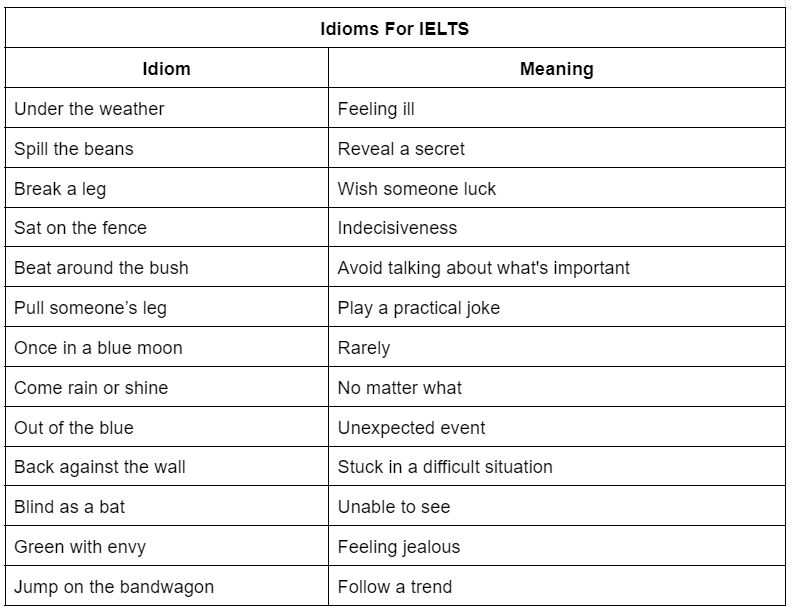Table of Contents
Vocabulary Words For IELTS: Developing a robust vocabulary is important when preparing for the IELTS exam, serving as the cornerstone of your groundwork. A proficient command of English vocabulary facilitates the articulation of your thoughts with ease and precision during the test. With a strong grasp of English vocabulary, expressing yourself becomes easy and interesting.
A good vocabulary is essential for all sections of the test: Listening, Reading, Writing, and Speaking. Remember, though, vocabulary alone isn’t enough. You also need to understand English grammar and accuracy to convey your thoughts accurately.

Also Check: How To Learn English Quickly
Vocabulary Words For IELTS
Improve your IELTS exam performance by mastering essential vocabulary. Our aim here is not to burden you with words, but to guide you towards the most relevant ones. We also strive to make the vocabulary easy to understand, though simplicity doesn’t necessarily mean it’s effortless.
Vocabulary Words For IELTS: Collocation Words
In simple terms, collocation refers to using words together in such a way that it sounds right. For instance, saying “Breaking Benjamin released many hit albums” sounds better than saying “Breaking Benjamin published many hit albums.”
Utilizing collocations accurately enhances your ability to convey ideas clearly and effectively, ensuring native speakers can comprehend them effortlessly. Mastery of collocations isn’t merely about logic; it’s about possessing the knowledge of them, as they are integral to fluent and natural communication.
Collocations come in different forms:
- Noun + Noun: Examples include “ceasefire agreement.”
- Noun + Verb: For instance, “plane took off.”
- Adjective + Noun: Like “excruciating pain.”
- Adverb + Adjective: Such as “fully satisfied.”
- Verb + Adverb: For example, “whispered softly.”
Idioms For IELTS
Idioms are phrases or expressions that have a meaning different from the literal interpretation of the words used. Check out some examples in the chart below:

Vocabulary Words for IELTS: Phrasal Verbs
Phrasal verbs are action-packed phrases, like “abide by” which means to obey. Let’s understand it with the help of some examples:
- Abide by: Follow the rules.
- Add up: Make sense of things.
- Agree with: Be on the same page.
- Back down: Retreat from a situation.
- Blow up: Explode with anger.
- Break into: Forcefully enter a place.
- Ease off: Reduce in intensity.
- Getaway: Make an escape.
- Get rid of: Remove something.
- Let down: Disappoint someone.
Understanding these phrasal verbs can make your language more dynamic and engaging.
Writing Vocabulary Words For IELTS
In this part, we’ll share some useful vocabulary for IELTS writing. These words are handy for the Writing Task 1 of the IELTS exam. In Task 1, you’ll need to describe, summarize, or explain a graph, table, chart, or diagram using your own words.
IELTS Writing Vocabulary for Task 1
Introduction
- The table/graph/chart provides information about…
- Looking at table/chart/graph, it can be seen that…
- The table/graph/chart illustrates…
- The table/graph/chart shows…
- According to the table/ graph/chart…
Signify Increase
- a significant increase
- a considerable growth
- to increase dramatically
- to rise sharply
- to show an upward trend
Signify Decrease
- a sharp fall
- a significant drop
- to decline sharply
- to show a downward trend
- to hit the lowest point
Signify Variation
- a considerable variation
- a slight fluctuation
- to vary considerably
- to show some fluctuation
Signify Stability
- a period of stability
- to remain stable
- to remain constant
Signify Plateau
- to reach a plateau
- to level off
- to flatten out
Don’t Miss
Vocabulary Words For IELTS Preparation
In this part, we’ll see some tips to prepare your vocabulary for the IELTS speaking test.
- Simply memorizing a long list of words won’t necessarily help you unless you understand how to use them. Focusing on enhancing your grammar, utilizing words accurately, pronouncing them correctly, and comprehending their meanings within sentences is likely to yield a higher score compared to merely memorizing random words.
- Don’t fall for lists claiming to have the “top 5” or “top 10” IELTS words. Your score in the test depends on how well you perform overall, not just on using a few fancy words.
- It’s important to prioritize using the right words that fit the context correctly. Even if you use advanced vocabulary, if your grammar is incorrect or the meaning doesn’t make sense, the examiner will notice. Instead of trying to use complex words, focus on gradually improving your vocabulary every day.
- Consistent effort is key to building your vocabulary, so aim to make small improvements each day rather than trying to learn everything at once.
Vocabulary Words For IELTS Resources
The following are the best resources for Vocabulary Words For IELTS:
- Cambridge Vocabulary for IELTS: This resource offers a structured approach, complete with practice exercises at the end of each section.
- IELTS Vocabulary Masterclass 8.5: Loaded with a diverse array of words and accompanying exercises, along with a convenient mini-dictionary tailored for listening and reading comprehension.
- Read Widely: Dive into articles and newspapers covering various subjects such as Education, Science, and more. Make note of unfamiliar words and delve into their meanings, synonyms, and usage. Maintain a record for future review.
- Listen to Podcasts: Explore podcasts available on platforms like Spotify. They provide an excellent opportunity to enrich your vocabulary while honing your listening and speaking skills
Importance of Vocabulary Words For IELTS
- Enhances Expression: A wide vocabulary enables candidates to express themselves more precisely and fluently during the speaking and writing sections.
- Improves Comprehension: Understanding a diverse range of vocabulary helps in comprehending reading passages and listening materials more accurately.
- Boosts Writing Score: Effective use of vocabulary demonstrates a higher level of language proficiency, which positively impacts the writing score.
- Facilitates Paraphrasing: Having synonyms and paraphrases at hand aids in avoiding repetition, which is crucial for achieving a higher score in writing and speaking tasks.
- Enriches Lexical Resource: Examiners look for a varied and sophisticated use of vocabulary, which contributes to a higher score in the lexical resource criterion.
- Strengthens Speaking Skills: Using a rich vocabulary allows candidates to articulate their thoughts more coherently and impressively during the speaking test.
- Aids in Describing Trends and Data: For tasks such as describing trends in graphs or charts, a diverse vocabulary enables candidates to accurately convey information without repeating words.
- Improves Reading Speed: Familiarity with a wide range of vocabulary helps in quickly grasping the meaning of words in reading passages, thereby improving reading speed and comprehension.
- Enhances Listening Skills: Recognizing a broad spectrum of vocabulary facilitates better understanding of spoken language, leading to improved performance in the listening test.
- Confidence Booster: Having a strong vocabulary instills confidence in candidates, allowing them to approach the exam with assurance and perform better overall..
Vocabulary Words For IELTS FAQs
Why is vocabulary important for the IELTS exam?
Vocabulary is crucial for the IELTS exam because it helps express ideas clearly and accurately, contributing to better performance across all test sections.
How does vocabulary impact my IELTS score?
Vocabulary accounts for 25% of the marks in the Writing and Speaking sections of the IELTS exam. A strong vocabulary improves comprehension, communication, and overall performance.
What types of vocabulary should I focus on for the IELTS exam?
Focus on diverse vocabulary types such as collocations, idioms, phrasal verbs, and subject-specific terminology to enhance your ability to communicate effectively in different contexts.
How can I improve my vocabulary for the IELTS exam?
Utilize resources like vocabulary books, online courses, podcasts, and reading materials covering common IELTS topics. Practice using new words in context and regularly review and revise your vocabulary.
Is vocabulary the only factor affecting my IELTS exam performance?
While vocabulary is crucial, other factors like grammar accuracy, comprehension skills, fluency, and coherence also influence your performance. Developing a well-rounded set of language skills is essential for success in the IELTS exam.








